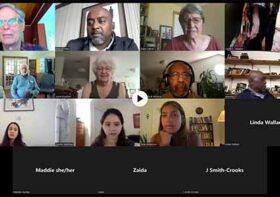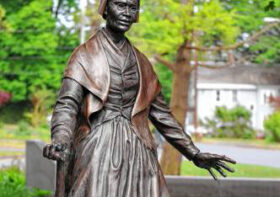Investing in People
In 2008, the Sojourner Truth Memorial Statue Committee awarded Remy Fernandez-O'Brien with one of its social justice scholarships. He then went on to study political science at Brown University, and now serves his local community by working at a community center. Throughout these experiences, he has remained committed to effecting social change, which is one of the qualities that our committee seeks to recognize in its scholarship recipients.
While at Brown University, Remy was an active student leader. “I did a lot of organizing in the student dance community, to make student dancers feel supported, respected, and like a cohesive whole as a community instead of separate dance groups,” Remy said. “As a DJ, I resurrected a dance party, Funk Nite, which had been a cultural bedrock for communities of color, but had fallen by the wayside.” At Brown, he was also a Resident Counselor and active with the Sexual Assault Peer Education program, which gives presentations on community responsibility and how to prevent sexual assault.
Of Remy's many volunteer and work experiences over the past few years, he has strongly supported immigrant rights. He has worked with Spanish-speaking immigrants to the United States in various capacities, teaching a basic computer skills class for Spanish-speaking adults and serving as a translator between case workers and constituents as an intern for U.S. Senator Sheldon Whitehouse (D-RI). In 2010, he also spent a few weeks on the Arizona-Mexico border, volunteering for a humanitarian group called No More Deaths (No Más Muertes). The group brings water, food, and medical attention to people crossing the border through the Sonoran Desert. Through these actions, Remy has impacted the lives of many immigrants, many of whom face unfair treatment by the U.S. government.
Remy is now the Communications and Facilities Coordinator at Lussier Community Education Center, work he was inspired to do by his Brown professor Charlie Cobb, who was a young field organizer for the Student Nonviolent Coordinating Committee. “Almost a decade before the civil rights movement became a nationally visible phenomenon, SNCC organizers like Charlie Cobb were going town-to-town in the deep South, organizing communities, building individual leaders, and opening folks' minds to the possibility of a better way of life,” Remy said. “The message that I took away from that was clear: taking the long view, the way to build power for social change is to invest in people--not around a specific cause, but as valued, self-actualized leaders. I think community centers like Lussier are excellent at this--they set up shop, invite people in, and guide them in setting up the kind of space that they would like to see in their community.”
Remy believes in the power of young people—not only to effect change, but to do so in a positive, joyful way. “I've always been particularly partial to social movements that treat protest as an opportunity to show the world a more positive way of being--like the people in Vieques, opposed to the US Navy using their island as a practice bombing site, who held a weekly Salsa party outside of the gates of the Navy compound,” Remy explained. “This is the quote that I live by: 'If we want joy and music and friendship and laughter at the end of our revolution, we must have joy and music and friendship and laughter along the way.'” (Gloria Steinem)


